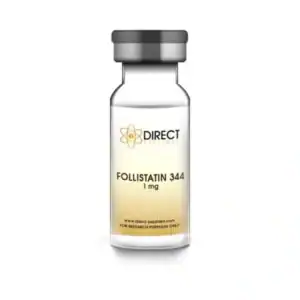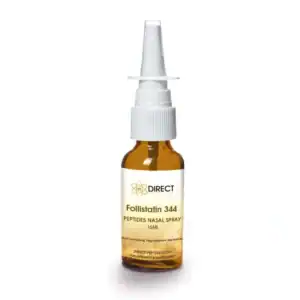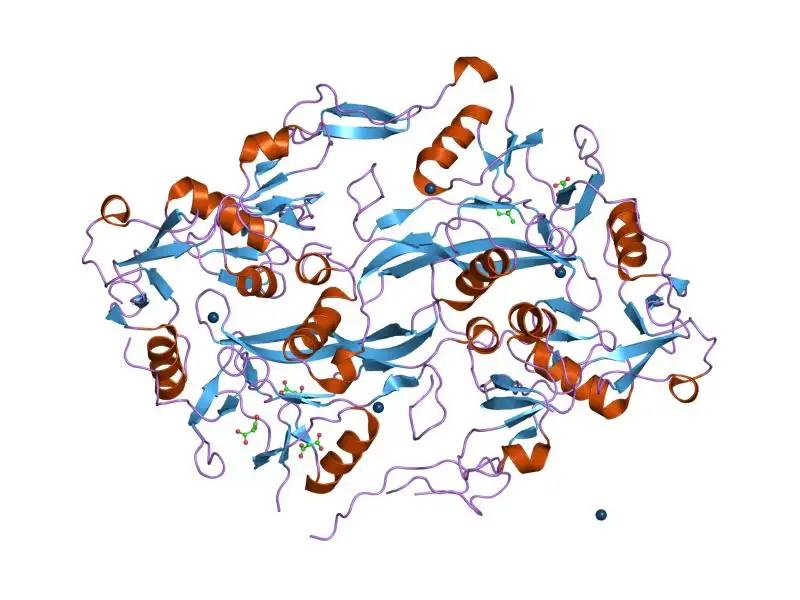Buy Follistatin 344 Peptide
Buy Follistatin 344 (FS344), a protein that blocks myostatin and activin, which regulate muscle growth and hormone release. This powerful peptide has potential as a therapy for muscle-related conditions like muscular dystrophy, sarcopenia, and cachexia, due to its ability to promote muscle growth and prevent muscle loss.
Shop our Full Range of Follistatin 344 Peptides
-
Sale!

Follistatin 344 Pre-Mixed Pen 1mg
£91.27 – £246.43Price range: £91.27 through £246.43 This product has multiple variants. The options may be chosen on the product page -

Follistatin 344 Peptide Vial
£117.98 – £124.78Price range: £117.98 through £124.78 This product has multiple variants. The options may be chosen on the product page -
Sale!

Follistatin 344 Nasal Spray
£96.69 – £188.38Price range: £96.69 through £188.38 This product has multiple variants. The options may be chosen on the product page
What Is Follistatin 344?
Follistatin 344, also known as FST 344, is a naturally occurring protein in the human body, recognized for its critical role in muscle physiology and the regulation of skeletal muscle mass. It achieves this by binding to and inhibiting myostatin, a protein that suppresses muscle growth, thereby promoting muscle protein synthesis and reducing muscle protein breakdown.
The inhibition of myostatin supports the development of lean muscle mass and enhances muscle metabolism. FST 344, a specific isoform derived from alternative splicing of the follistatin gene, also influences muscle cells and catabolic pathways. While it shows promise in medical research and bodybuilding, its use outside clinical settings remains controversial.
Follistatin 344 Mechanism Of Action
As a glycoprotein it plays a crucial role in regulating muscle growth and tissue development by targeting key signaling pathways. It has a dual action of binding to and inhibiting members of the transforming growth factor-beta (TGF-β) superfamily, particularly myostatin and activins, which signal through the activin type IIB receptor (ActRIIB).
Myostatin, a negative regulator of muscle growth, is neutralized by FST 344, promoting muscle hypertrophy and regeneration. Additionally, it modulates activin signaling, influencing processes like inflammation, reproduction, and cell differentiation. Its amino acid structure enables this dual inhibition, making it a promising therapeutic target for muscle wasting diseases, fibrosis, and metabolic disorders.
Structure of Follistatin 344
Sequence: MVRARHQPGG LCLLLLLLCQ FMEDRSAQAG NCWLRQAKNG RCOVLYKTEL SKEECCSTGR LSTSWTEEDV NDNTLFKWMI FNGGAPNCIP CKETCENVDC GPGKKCRMNK KNKPRCVCAP DCSNITWKGP VCGLDGKTYR NECALLKARC KEOPELEVOY QGRCIORCRD VFCPGSSTCV VDCITNNAYCV TCNRICPEPA SSEQYLCGND GVTYSSACHL RKATCLLGRS IGLAYEGKCI KAKSCEDIQC TGGKKCLWDF KVGRGRCSLC DELCPDSKSD EPVCASDNAT YASECAMKEA ACSSGVLLEV KHSGSCNSIS EDTEEEEEDE DODYSFPISS ILEW
Molecular Formula: C1350H2153N405O433S39
Molecular Weight: 3780 g/mol
What Are The Research Benefits of Follistatin 344
Promotes Muscle Growth: By inhibiting myostatin and activin A, both key regulators of muscle growth, studies have shown it has potential to increase muscle mass and reduce muscle stiffness [1].
Improves Metabolic Health: Research suggests that follistatin plays a role in glucose metabolism and may contribute to improved insulin sensitivity [2].
Potential Anti-Aging Effects: It has been studied for its possible ability to aid in tissue regeneration and counteract age-related declines in muscle and connective tissue quality [3].
Enhances Cell Proliferation: Studies indicate that it may support cell proliferation by promoting the growth and repair of various tissues. This property is particularly significant in regenerative medicine, as it could assist in healing damaged tissues and fostering recovery after injury [4].
Supports Reproductive Health: It has been linked to roles in reproductive health, particularly in regulating hormones involved in the reproductive system. Research suggests that follistatin interacts with activins, which are important for processes such as follicle development and ovulation in females, as well as spermatogenesis in males [5].
May Enhance Recovery: By promoting protein synthesis and inhibiting muscle degradation, follistatin could be beneficial in recovery from injuries or intensive physical training [6].
Addresses Metabolic Disorders: Studies have investigated its ability to counteract conditions like obesity and diabetes by regulating fat and muscle tissue through positive growth signals [7].
Potential Role in Congenital Blindness: Emerging research has investigated whether FST could have implications for addressing certain aspects of congenital blindness, particularly through its involvement in tissue regeneration and cellular growth. Although direct evidence remains limited, its ability to influence differentiation and repair processes may provide avenues for future therapeutic strategies [8].
Potential Role in Cancer Research: Emerging studies suggest that follistatin might play a role in cancer treatment by modulating tumour growth and muscle wasting associated with cancer cachexia [9]. Research indicates that its ability to inhibit myostatin and activin signalling pathways could help mitigate muscle loss and improve overall quality of life in cancer patients [10].
Follistatin (FST) expression is lower in breast cancer tissues compared to normal tissues. A clinical study on the reverse transcription polymerase chain reaction confirms this difference. Overexpression of FST can reduce tumor invasiveness and metastasis. As a suppressor of activin signaling, which drives cancer cell migration and invasion, FST is a promising therapeutic target for breast cancer [11].
Buy Follistatin 344 peptide 99% purity in a convenient 1 mg vial here. For easy reconstitution, we also offer a 1mg kit that includes bacteriostatic water and syringes. Order online today for all your research needs!
Other Myostatin Inhibitors
Myostatin inhibitors have been explored for their potential to boost muscle growth and treat muscle-related conditions.
Peptide Ace-031, a soluble activin receptor type IIB (ActRIIB) fusion protein, is one such inhibitor.
It works by binding to myostatin and other TGF-beta proteins, preventing them from interacting with their natural receptors and reducing their ability to limit muscle growth.
Preclinical studies have shown that Ace-031 can significantly increase muscle strength and mass.
However, human trials revealed side effects like nosebleeds and increased vascularity, which require further research.
Despite these challenges, Ace-031 and similar inhibitors show promise for treating muscle atrophy and neuromuscular conditions.
Visit the ACE-031 peptide category page for more information about this peptide.
Buy Follistatin 344 Peptide Nasal Spray
Buy Follistatin 344 nasal spray, a non-invasive, convenient way to leverage FS344’s therapeutic potential. It allows direct absorption into the bloodstream, bypassing the digestive system for improved bioavailability and efficacy.
The spray may support muscle cell growth and regeneration, making it useful for research on neuromuscular diseases or muscle-wasting conditions. Buy Follistatin 344 nasal spray available in 15ml and 30ml.
Frequently Asked Questions (FAQs) about Follistatin 344
Is FS344 safe to use?
It is intended for research use only and is not approved for human consumption. Research on the peptide, particularly in humans, is still in its early stages. While animal studies have shown promising results, the safety and efficacy for human use require further investigation and clinical trials.
What is the difference between GDF-8 (Myostatin) and Follistatin 344?
GDF-8, or Myostatin, and Follistatin 344 are proteins with opposite roles in muscle growth. GDF-8 signals the body to limit muscle growth, while FST344 blocks GDF-8, promoting muscle growth and repair. This balance makes it important in research on muscle-wasting conditions and therapies to increase muscle mass. While GDF-8 naturally regulates muscle size, FST344’s ability to inhibit it opens up potential for targeted muscle growth treatments. You can learn more about GDF-8 Peptide here.
Can Follistatin 344 be used for athletic performance enhancement?
Although its muscle-boosting potential is appealing, the use of the compound for athletic enhancement is not approved and raises ethical and regulatory concerns within sports disciplines.
Is Follistatin 344 illegal?
The legal status varies depending on the country and its specific regulations. For example, in the United States, the FDA has not approved Follistatin 344 for medical or recreational use due to limited research on its safety and efficacy. The MHRH in the UK has also not approved the coumpound.
It is often classified as a research chemical and is only legally available for scientific studies. However, possession or use outside of these contexts may be restricted or fall into a legal grey area. Therefore, it is essential to consult local laws and regulations before considering its usage.
What are the side effects of Follistatin 344?
The side effects are not fully understood due to limited data from human studies. Potential risks could include its off-target effects or disruptions in other body systems regulated by myostatin.
How is Follistatin 344 administered?
Currently, it is primarily used in research settings and is typically administered via injection in laboratory studies. Clinical formulations for general use remain unavailable.
Buy Follistatin 344 Pre-Mixed Peptide Pen from Direct Peptides. There is the option to buy pre-mixed cartridge kits which include a cartridge (mixed with the peptide and bacteriostatic water), pen, case, and needle tips. Single cartridges (1, 2, or 3) come with needle tips but no kit.
Summary of Research Applications
- Promotes strength
- Enhances wound healing
- Supports immune system
- Aids in muscle recovery
- Enhances metabolic health
Pro Tip: When you buy Follistatin 344 ensure the vial has reached room temperature for optimal results.
1 mg Follistatin 344 Peptide Quality Assured
At Direct Peptides, we deliver 99% pure Follistatin 344 peptides, manufactured to strict quality standards for research purposes. By choosing to buy Follistatin 344 peptides from us, researchers gain access to products that prioritise safety, reliability, and precision.
Our peptides support scientific studies on muscle growth, cell regeneration, and metabolic regulation, ensuring accurate and trustworthy results for advanced research.
References For Further Reading
[1] S J Lee (2004) Regulation of muscle mass by myostatin – Annual Review of Cell & Developmental Biology, 2004, Volume 20, Pages 61-86.
[2] Chunxia Zhao, Chunping Qiao, Ru-Hang Tang, Jiangang Jiang, et al (2015) Overcoming Insulin Insufficiency by Forced Follistatin Expression in β-cells of db/db Mice – Molecular Therapy, 2015 May, Volume 23 (Issue 5), Pages 866-874.
[3] Chitra C. Iyer, Deepti Chugh, Prameela J. Bobbili, et al (2021) Follistatin-induced muscle hypertrophy in aged mice improves neuromuscular junction innervation and function – Neurobiology of Aging, Volume 104, August 2021, Pages 32-41.
[4] Hélène Gilson, Olivier Schakman, Stéphanie Kalista, Pascale Lause, et al (2009) Follistatin induces muscle hypertrophy through satellite cell proliferation and inhibition of both myostatin and activin – American Journal of Physiology, Endocrinology and Metabolism, 2009 Jul, Volume 297 (Issue 1), Pages E157-64.
[5] D M de Kretser, M P Hedger, K L Loveland, and D J Phillips (2002) Inhibins, activins and follistatin in reproduction – Human Reproduction Update, 2002 Nov-Dec, Volume 8 (Issue 6), Pages 529-41.
[6] Helge Amthor, Raymond Macharia, Roberto Navarrete, Markus Schuelke, et al (2007) Lack of myostatin results in excessive muscle growth but impaired force generation – Proceedings of the National Academy of Sciences of United States of America, 2007 Feb 6, Volume 104 (Issue 6), Pages 1835-40.
[7] Alexandra C McPherron and Se-Jin Lee (2002) Suppression of body fat accumulation in myostatin-deficient mice – Journal of Clinical Investment, 2002 Mar 1, Volume 109 (Issue 5), Pages 595–601.
[8] Max D Knickmeyer, Juan L Mateo, Priska Eckert, Eleni Roussa, et al (2018) TGFβ-facilitated optic fissure fusion and the role of bone morphogenetic protein antagonism – Open Biology, 2018 Mar, Volume 8 (Issue 3), Pages 170134.
[9] Yann S Gallot, Anne-Cécile Durieux, Josiane Castells, Marine M Desgeorges, et al (2014) Myostatin gene inactivation prevents skeletal muscle wasting in cancer – Cancer Research, 2014 Dec 15, Volume 74 (Issue 24), Pages 7344-56.
[10] Lei Shi, Jeyna Resaul, Sioned Owen, Lin Ye, and Wen G Jiang (2016) Clinical and Therapeutic Implications of Follistatin in Solid Tumours – Cancer Genomics & Proteomics, 2016, Volume 13 (Issue 6), Pages 425-435.
[11] C Zabkiewicz, J Resaul, R Hargest, W Guo Jiang, and L Ye (2017) Increased Expression of Follistatin in Breast Cancer Reduces Invasiveness and Clinically Correlates with Better Survival – Cancer Genomics Proteomics, 2017 Jul-Aug; 14 (4): Pages 241-251.
Why Choose Direct Peptides ?
Direct Peptides provides high quality Follistatin 344 products, including peptide vials, nasal sprays, and pre-mixed options, meeting diverse research needs. If you’re looking to buy Follistatin 344, Direct Peptides ensures rigorous quality testing, competitive pricing, and fast shipping to deliver reliable solutions. Their excellent customer support further enhances the experience, making them a trusted choice for researchers aiming to explore FS344’s therapeutic potential.
ALL CONTENT AND PRODUCT INFORMATION AVAILABLE ON THIS WEBSITE IS FOR EDUCATIONAL PURPOSES ONLY.
DISCLAIMER: These products are intended solely as a research chemical only. This classification allows for their use only for research development and laboratory studies. The information available on our Direct Peptides website: https://direct-peptides.com is provided for educational purposes only. These products are not for human or animal use or consumption in any manner. Handling of these products should be limited to suitably qualified professionals. They are not to be classified as a drug, food, cosmetic, or medicinal product and must not be mislabelled or used as such.
Related Posts

ACE-031 Vs Follistatin 344
This blog compares ACE-031 and Follistatin 344, focusing on their muscle growth potential, mechanisms, safety, and legal aspects. It highlights their role in regulating myostatin and applications in aging and veterinary medicine, stressing the need for ethical research and compliance.

What Is The Effect Of Myostatin Inhibition?
The blog examines how inhibiting myostatin, a protein that regulates muscle growth, can boost muscle development, aid fat loss, and prevent muscle degeneration. It also explores compounds like ACE-031 and Follistatin 344, their uses, benefits, risks, and ethical concerns.

